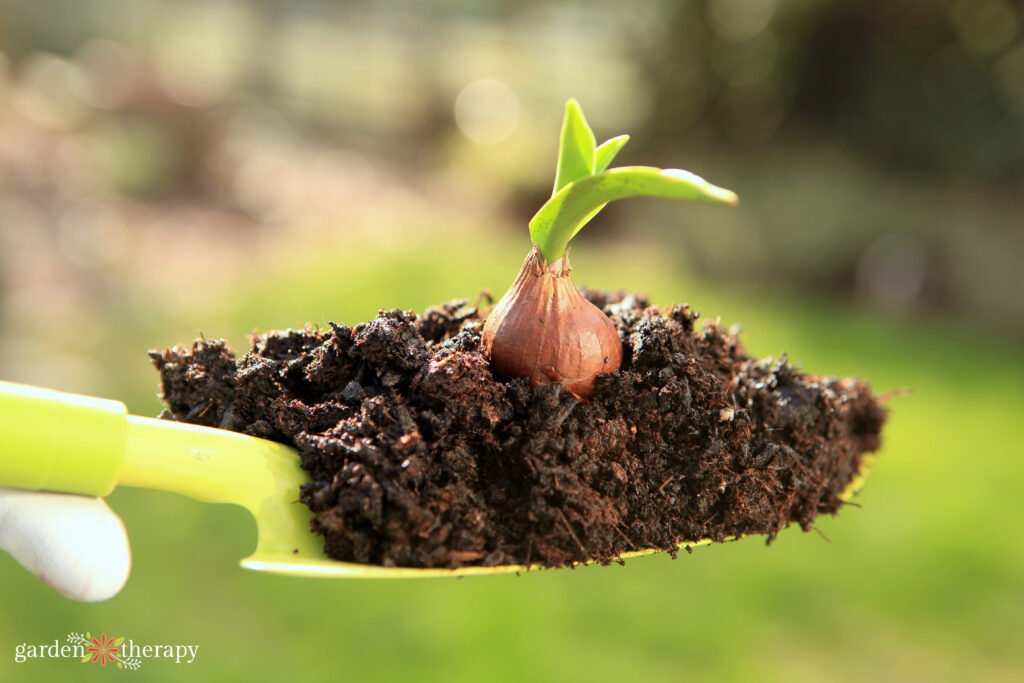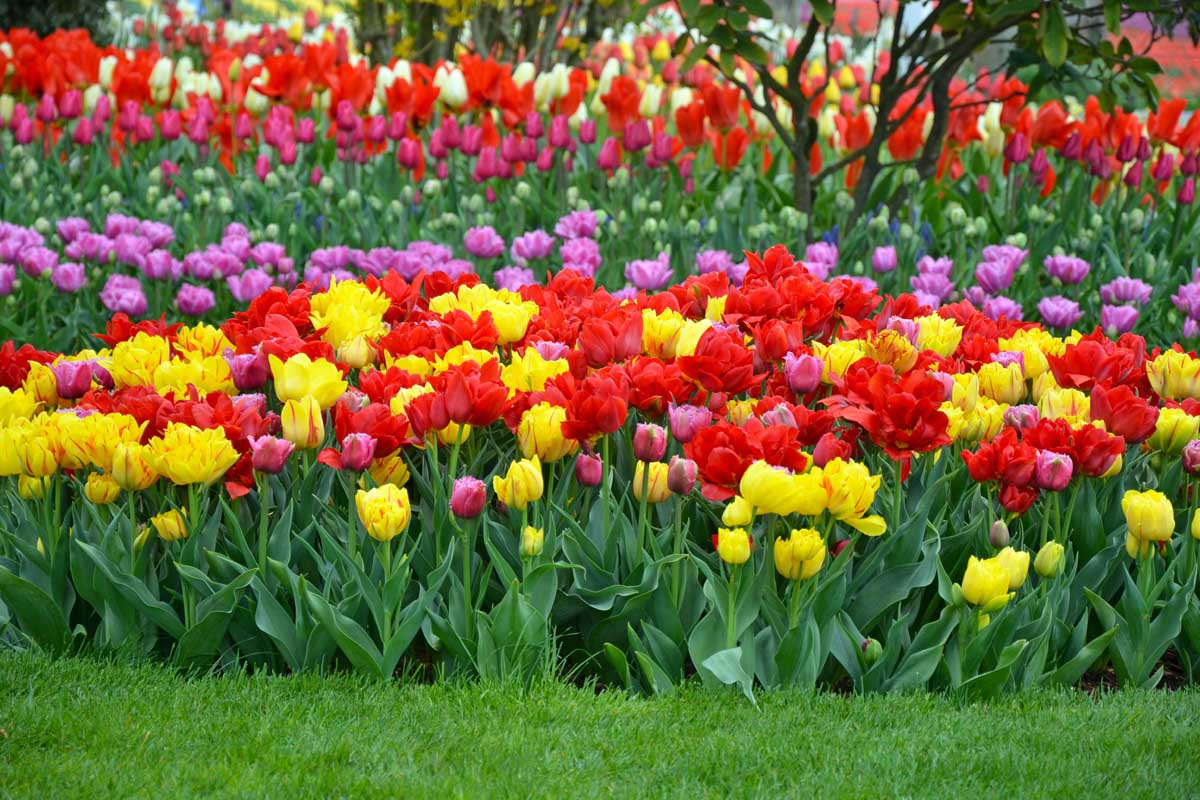
🌷 How to Grow Tulips from Bulbs: Your Complete Step-by-Step Garden Guide
There’s nothing quite like the sight of tulips blooming in early spring—standing tall and proud, bringing bold pops of color after a long, gray winter. These classic, vibrant flowers are among the easiest to grow from bulbs, and they make a gorgeous statement whether you plant them in beds, borders, containers, or even a front lawn.

Whether you’re new to gardening or just want to level up your spring bloom game, this guide will walk you through how to grow tulips from bulbs, including planting, care, and after-bloom maintenance. You’ll also get advanced tips, FAQs, and tricks to help your tulips come back stronger year after year.
🌱 Why Choose Tulips?
Tulips are one of the most iconic spring bulbs for a reason:
- 🌈 Wide variety of colors and shapes — from classic reds and yellows to fancy fringed, double, and parrot types.
- 🧊 Cold-hardy and reliable — thrive in USDA Zones 3–8.
- 🏡 Perfect for containers or gardens — great for borders, cut flowers, or even mass plantings.
- 🎨 Easy to mix and match — they pair beautifully with daffodils, hyacinths, and pansies.
🧾 Supplies You’ll Need
Before getting your hands dirty, gather your supplies:
- Tulip bulbs (firm, healthy, and mold-free)
- Trowel or bulb planter
- Well-draining soil or compost
- Garden gloves (tulip bulbs can cause skin irritation)
- Mulch (optional)
- Watering can or hose
📅 When to Plant Tulip Bulbs
Timing is everything when it comes to tulips.
- Best planting time: Fall — typically 6 to 8 weeks before your ground freezes. This gives the bulbs time to develop roots before winter.
- In most regions, that’s September to November.
- In warmer climates (zones 8–10), tulip bulbs need pre-chilling (see tip below).
🌡️ Pro Tip for Warm Regions: Store tulip bulbs in the refrigerator for 10–12 weeks before planting. Keep them away from fruits like apples, which emit ethylene gas that can damage the bulbs.
🪴 Step-by-Step: How to Plant Tulip Bulbs in the Ground

1. Pick the Perfect Spot
Tulips thrive in full sun to partial shade—at least 6 hours of direct sunlight daily.
Choose a location with well-drained soil. Tulips hate soggy feet—excess water causes rot.
2. Prepare the Soil
- Loosen soil to a depth of about 12 inches.
- Mix in compost or well-aged manure to boost nutrients and improve drainage.
- Aim for a slightly acidic to neutral pH (6.0–7.0).
3. Planting Depth and Spacing
- Depth: Plant tulip bulbs about 6–8 inches deep, measuring from the base of the bulb.
- Spacing: Leave about 4–6 inches between bulbs.
- Always plant bulbs pointed side up (flat side down).
Bonus Tip: For a natural-looking display, stagger bulbs in clusters of odd numbers (like 5 or 7) rather than planting them in rows.
4. Water Them In
Give the newly planted bulbs a good soak to help settle the soil and jumpstart root growth. After that, nature usually takes care of moisture through winter and early spring.
🪴 Container Planting: Tulips in Pots
If space is tight or you want a more flexible tulip display, containers are a great choice.
Here’s how:
- Use pots with drainage holes.
- Fill with a light potting mix or bulb mix.
- Plant bulbs closer together (about 1–2 inches apart) since pots won’t require long-term spacing.
- Cover bulbs with at least 5–6 inches of soil.
- Water thoroughly and keep containers cool and dark for 10–12 weeks (like a garage or shed).
When shoots appear, move pots into the sun and enjoy the blooms!
🌿 Tulip Care After Planting

Tulips don’t require much once planted, but there are a few things to keep in mind for healthy spring blooms:
- Avoid overwatering: Too much water in winter can cause bulbs to rot.
- Mulch lightly: Especially in colder zones, apply 1–2 inches of mulch to insulate the soil.
- Watch for critters: Squirrels and voles love tulip bulbs. Try sprinkling crushed red pepper or using wire mesh over the soil.
🌸 Spring: Bloom Time!
As winter fades, you’ll start seeing tulip shoots emerge—first the leaves, then tall stems, and finally, bold, colorful flowers.
Here’s what to expect:
- Blooms last about 1–2 weeks, depending on the variety and weather.
- Cooler temps help blooms last longer.
- Deadhead spent flowers (cut off the bloom stalk) to prevent seed formation and direct energy back to the bulb.
🍃 Post-Bloom Care: What to Do After Tulips Flower
Once your tulips have finished blooming, it’s tempting to cut everything back—but resist!
Follow these steps:
- Remove only the spent flower—not the leaves.
- Let the foliage turn yellow and die back naturally (takes 4–6 weeks).
- During this time, the plant is recharging the bulb for next year.
- Once leaves are dry and brown, you can remove them.
🔁 Should You Dig Up Tulip Bulbs Each Year?
That depends on your climate and tulip variety:
| Situation | What to Do |
|---|---|
| Cold winter climate (Zones 3–7) | Bulbs can stay in the ground. |
| Warm winter (Zones 8–10) | Dig up and refrigerate bulbs. |
| Fancy hybrids or low-return types | Replant new bulbs each fall. |
Note: Some tulip hybrids (especially double or exotic types) don’t perennialize well and may need to be replanted every year.
🧤 Common Tulip Growing Problems (and How to Fix Them)
:max_bytes(150000):strip_icc()/tips-planting-tulips-bulbs-getty-0523-cd6ffa2a20e043998b9b65f2439314df.jpg)
| Problem | Cause | Solution |
|---|---|---|
| No blooms in spring | Bulbs were planted too shallow or didn’t chill | Plant deeper; pre-chill bulbs in warm zones |
| Small or weak flowers | Poor soil nutrition or overcrowding | Add compost; divide bulbs every few years |
| Leaves but no flowers | Too much nitrogen or too little sun | Use balanced fertilizer; choose sunnier spot |
| Bulbs rotted or gone | Poor drainage or pests | Improve soil; protect from critters |
Table of Contents
❓ Frequently Asked Questions
Q: Can I plant tulips in spring?
Technically yes, but not ideal. Tulips need a cold period to bloom. If you missed the fall window, try planting pre-chilled bulbs for late spring blooms—but don’t expect much the first year.
Q: Can I grow tulips indoors?
Yes! You can force tulips in pots indoors. Chill bulbs in the fridge for 10–12 weeks, then pot them up and keep them in a bright spot. Great for winter blooms!
Q: Will tulips come back every year?
Some tulips are perennial, others are best treated as annuals. Darwin hybrids and species tulips (like Tulipa tarda) are more likely to return reliably each year.
Q: How long do tulips last in bloom?
Each bloom typically lasts 1–2 weeks, but the total display can stretch 3–4 weeks with different varieties and staggered bloom times.
Q: How do I keep squirrels from digging up tulip bulbs?
Try using chicken wire over the planting area, dusting the soil with cayenne pepper, or planting tulips alongside squirrel-repelling bulbs like daffodils or alliums.
✅ Conclusion: Why Tulips Belong in Every Garden
If you want a low-maintenance, high-reward flower that delivers a burst of color and elegance in early spring, tulips are your go-to. From their wide range of colors to their iconic shape and simple care, they’re the kind of flower that brings pure joy to any gardener.
Growing tulips from bulbs might seem a bit mysterious at first, but it’s actually very straightforward—and incredibly satisfying. Just plant them in fall, give them some chill time, and let nature do the rest. With the right care, your tulips will come back stronger and more beautiful year after year.
So grab a handful of bulbs this season, get them in the ground, and let your garden surprise you next spring with a show that’s absolutely worth the wait. 🌷
🧾 Quick-Reference Tulip Planting Chart
| Tulip Task | Details |
|---|---|
| Best Planting Time | Fall (6–8 weeks before ground freezes) |
| Soil Requirements | Well-drained, fertile, pH 6.0–7.0 |
| Planting Depth | 6–8 inches |
| Bulb Spacing | 4–6 inches apart |
| Sunlight Needed | 6+ hours of direct sunlight |
| Watering | Once after planting; moderate in spring |
| Mulching (optional) | 1–2 inches in cold regions |
| Chill Requirement | Yes—especially in warm zones |
| Bloom Duration | 1–2 weeks per flower |
| Post-Bloom Care | Remove blooms, leave foliage intact |
